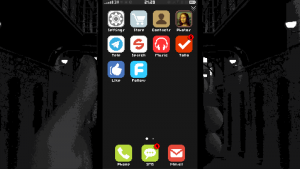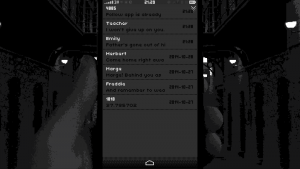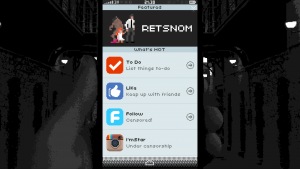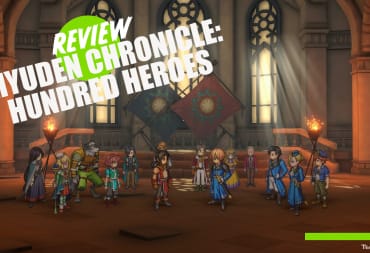Replica plays upon the invasiveness that few in the cyber age are unfamiliar with: looking through someone else’s cellphone. It's difficult not to appreciate the realistic details and hard-hitting themes that developer SOMI Games places in such a limited space. Though often repetitive, Replica packs a narrative of psychological mystery that keeps you thinking about truth, justice, and the weight of your actions.
Nothing is more impacting about Replica than its ability to ignite real emotions. The game opens in a gloomy, colorless setting. The only clear image on the screen is that of your pixelated hand holding a smartphone. The lock screen displays notifications for a few missed calls and some unread text messages. Besides this, not much can be revealed until you can crack the phone’s passcode. The reality hits: Intrusion is inevitable.

Once you gather enough clues to enter the right passcode, guilt becomes power. You now possess complete knowledge of a stranger’s memories, relationships, and even their secrets. Suddenly, an unknown number calls. The voice informs you that it is your duty to search this phone for evidence of terrorist affiliation. Suddenly, that power in your hands is no longer innocent. The fate of an individual, and perhaps even that of a nation, depends on what you choose to do.
It is nothing short of impressive that Replica creates complex themes with little dialogue. Most of the narrative is provided by a Homeland Security agent that directs objectives and their consequences, though some interaction with other characters is possible. The most powerful moments in Replica occur whenever the player comes across something that would otherwise be insignificant. Whether it’s a nostalgic photo of the cell phone owner’s friends or the reasoning behind their social media password, Replica honestly represents the human psyche.

To gather evidence, players must click on any piece of information that might be relevant to the investigation. The options are numerous and varied, since text messages, photos, internet searches, and social media posts lead to evidence. The difficulty of completing objectives is realistic and genuine to the setting. While some, like the messaging app, blatantly reveal information, others make it somewhat more challenging to discover anything relevant. It would seem odd for the suspect to be entirely careless about their actions, but it would be just as frustrating if they kept almost no record of suspicious activity. Replica does a great job of making it reasonably difficult or easy to tie clues together without compromising the cell phone owner’s personality.
Poking for clues in Replica is just as responsive as it would be on a real phone. It’s mostly exciting to open (and occasionally hack) the phone’s apps in search of evidence. Because some apps are unlocked only after uncovering enough evidence, players must often backtrack to remember relevant information. The game does make an effort to remind players of accomplished tasks via the Homeland Security agent’s texts, but searching through these can become cumbersome as the game progresses.
Replica makes a point of getting the most out of its smartphone mechanic. Each of the game’s features cleverly fit into the narrative in some way, which is particularly the case of Replica’s convincing doppelgangers of real world social media apps. Replica’s eerie, mysterious music fits its tone extremely well. But what fits even better is the fact that the soundtrack plays through an in-game app. A To-Do list app tracks and directs all objectives. Even adjusting Replica’s settings is intuitive, as the phone's setting app houses these. Fine details such as these go a long way in keeping the player immersed in Replica’s story.

Though there are twelve endings in Replica, there doesn’t seem to be a large incentive for multiple playthroughs. There’s a sense of curiosity and often regret, about how taking different routes impacts the story. But having to start from scratch after an ending takes its toll on patience. The early stage of Replica is always linear, requiring the same sequence of actions. Subsequent playthroughs remove any sense of mystery, as players are likely to rush through this section without discovering any new information. Though the payoff can be worthwhile, it takes far too long for any new strategy to make a meaningfully different impact on the story’s conclusion.
Replica is a surreal experience with an impressive amount of detail. Forcing players to invade the private thoughts, conversations, and relationships of another individual presents strong themes and emotions. Searching through Replica’s many apps and messages feels like it would in the real world, but can become monotonous when the story becomes more complex. Despite the fact that the excitement wears off after a few playthroughs, Replica is a game that ingeniously immerses players into an interactive, complex mystery.
Replica was reviewed on PC via Steam with a code provided by the developer.
Review Summary
Replica offers a great interactive experience. Its story is complex, with an ability to make players reconsider all of their actions and ideals. Replica's cellphone-inspired gameplay is immersive and realistic. Unfortunately, the story is repetitive after the first playthrough and backtracking is monotonous as the narrative expands. Still, Replica creates a shocking experience for anyone who likes a good mystery.
(Review Policy)Have a tip, or want to point out something we missed? Leave a Comment or e-mail us at tips@techraptor.net













